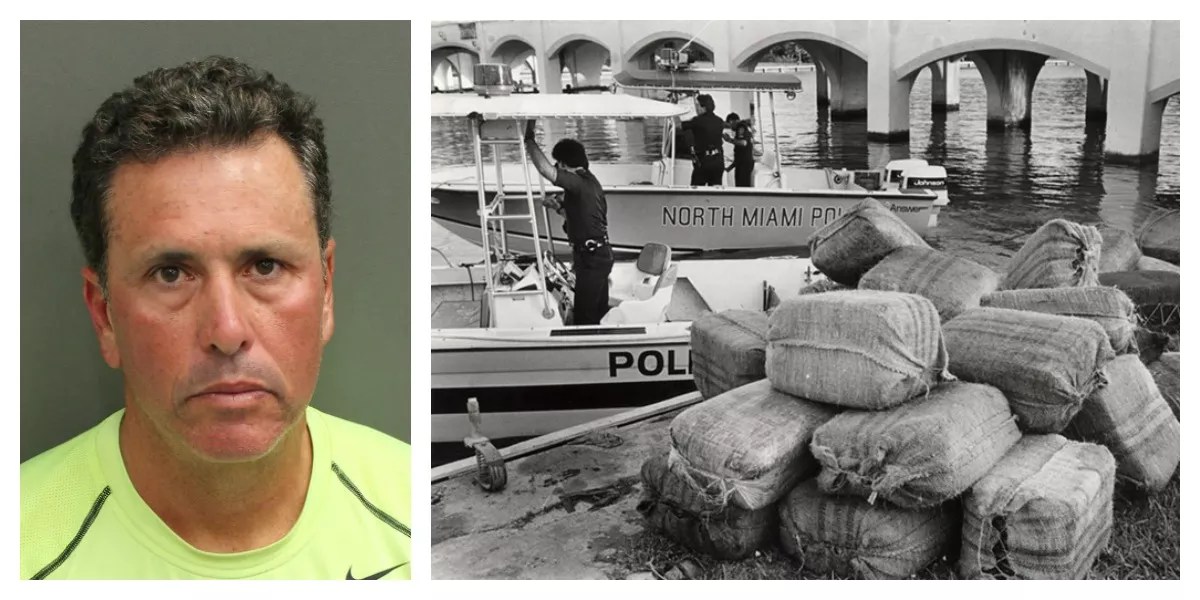
Orange County Jail/HistoryMiami

Audio By Carbonatix
Update 2/1/18: Falcon has pleaded guilty to drug trafficking charges and faces 20 years in prison.
Twenty-six years ago, the feds busted Miami’s biggest smuggling operation of the Cocaine Cowboys era: a $2 billion pipeline run by high-school pals Willy Falcon and Sal Magluta. It would take another decade of contentious court battles before the pair was finally convicted, wrapping up one of the nation’s most massive drug cases.
But there was always a loose end. Just before the two were indicted in 1991, Gustavo “Taby” Falcon, Willy’s brother, vanished. He hadn’t been seen since – until yesterday, when federal agents found him in a rented home in Kissimmee. Falcon was nabbed as he returned from a bike ride with his wife and hauled off to Orange County Jail in a neon Nike shirt.
The feds have yet to release information about how they found Gustavo in Kissimmee. In fact, the U.S. Marshals’ site still lists the 55-year-old on its page of most wanted fugitives.
Gustavo Falcon’s arrest ties a final bow around one of the most extraordinary cases of the cocaine-fueled ’80s in Miami. By the time the feds finally took down Falcon and Magluta’s empire, it included multiple banks, scores of luxury properties across South Florida, and even a professional speedboat-racing operation.
Willy and Sal had met at Miami Senior High School, though both ended up dropping out before they graduated. Instead, the friends got into the booming cocaine business. Miami New Times‘ Jim DeFede wrote numerous feature stories about the pair in the early ’90s. Here’s how he described the empire’s origins:
Investigators believe Falcon and Magluta started off as small-time dope peddlers in high school. Of the two, Falcon was the charmer, the ambassador of the fledgling organization, the one who typically would establish important contacts. Once Falcon had set up a meeting, it would be Magluta who negotiated the fine points of the deal, weighing the risks against the benefits.
That small start grew into a criminal organization that helped to pioneer the Miami end of the Colombia-to-Florida pipeline that would soon become the world’s most heavily trafficked coke route.
Business was good – incredibly good. As the money poured in, the friends diversified, pouring their cash into all kinds of operations. Here’s how DeFede described the scope of their wealth:
At home in South Florida, prosecutors say, Falcon and Magluta hid millions of dollars in local banks they secretly controlled. Loans from those banks financed construction companies and management firms that built or bought millions of dollars worth of property across Dade County. Federal agents have seized houses in Coral Gables, Flagler Waterway Estates, and Doral Woods, penthouses on Brickell Key Drive, and a ranch in South Dade, as well as apartment complexes in Hialeah and Miami. Falcon and Magluta also owned a condominium in Vail; a farm, complete with airstrip, south of Lake Okeechobee; and real estate in the Florida Keys…
Falcon and Magluta constructed their empire, not while maintaining a low profile, but while basking in the public spotlight. Throughout the early and mid-Eighties, both men, and many others within their organization, were stars on the powerboat racing circuit – the preferred sport of drug smugglers. Falcon won the 1986 Offshore Challenge off the Florida Keys; Magluta won three national championships and was a member of the commission that oversees the American Power Boat Association.
Willy was the kingpin, but the feds say Gustavo was a key piece of the organization. When the organization was finally busted in 1991, Gustavo was one of ten men charged with running the operation.
The original 1991 Willy and Sal indictment with Gustavo as a co-defendant pic.twitter.com/MmKjJZRd4w
— Jim DeFede (@DeFede) April 13, 2017
The feds captured Willy and Sal in dramatic fashion. Here’s DeFede’s description of the busts:
Everyone wanted to be in on the arrest of Willy and Sal, to be able to say they’d been there when the legend died. So on a rainy afternoon last October, as darkness fell over Sal Magluta’s palatial La Gorce Island home in Miami Beach, dozens of federal, state, and local agents stood by as a specially trained, 25-man assault team from the U.S. Marshals Service stormed the house and captured the elusive Magluta. Five hours later, with the rain still pouring down, the same team of agents raided the Fort Lauderdale mansion of Willy Falcon.
But Gustavo, unlike his brother, didn’t stick around to get hauled off by agents. He disappeared and was never heard from while court battles dragged on against Willy and Sal. Although the feds were able to keep the pair in prison on lesser charges, their first attempt at convicting the two of running an operation that smuggled at least 75 tons of yeyo into the States failed.
In fact, it wasn’t until a retrial in 2002 that prosecutors finally made the charges stick. Magluta got hammered with a 195-year sentence; Willy got 20 years after finally agreeing to cut a plea deal.
But Gustavo was still nowhere to be found. Until last night. Orange County Jail records show he was booked around 6:30 p.m., and though no charges are listed on the docket, his original 1991 charges are still listed as open in federal court.
The timing of the bust is auspicious: Just two months ago, Cocaine Cowboys director Billy Corben announced he and partner Alfred Spellman are at work on a third segment of their hit documentary series, this time focusing on the tale of Willy and Sal.
“It’s a story about a family business and men who were so well loved and respected by their community – despite their being the godfathers of a multibillion-dollar cocaine-trafficking business – that they were able to corrupt a federal jury in one of the most notorious and outrageous events in the history of the American justice system,” Corben said in January.